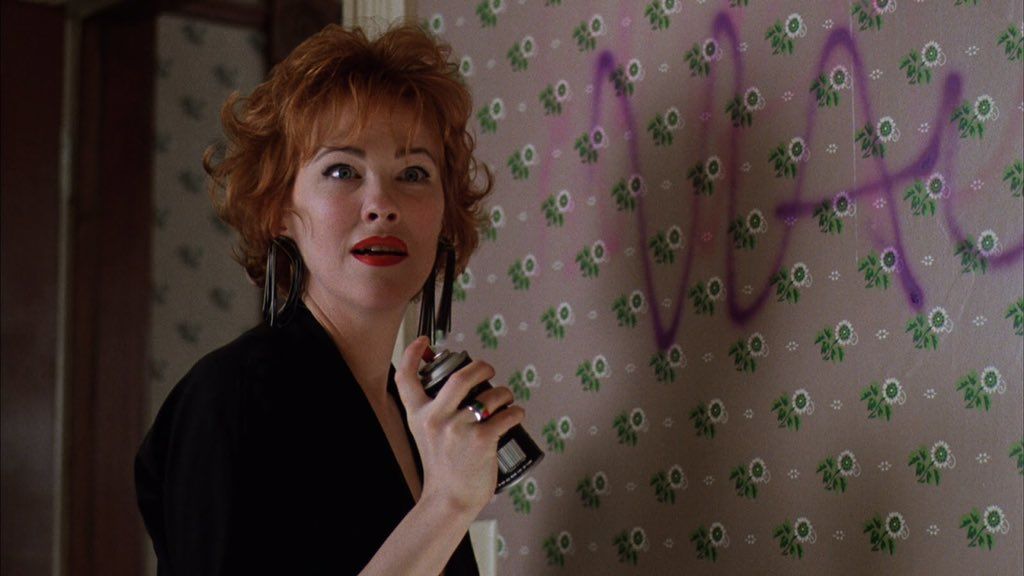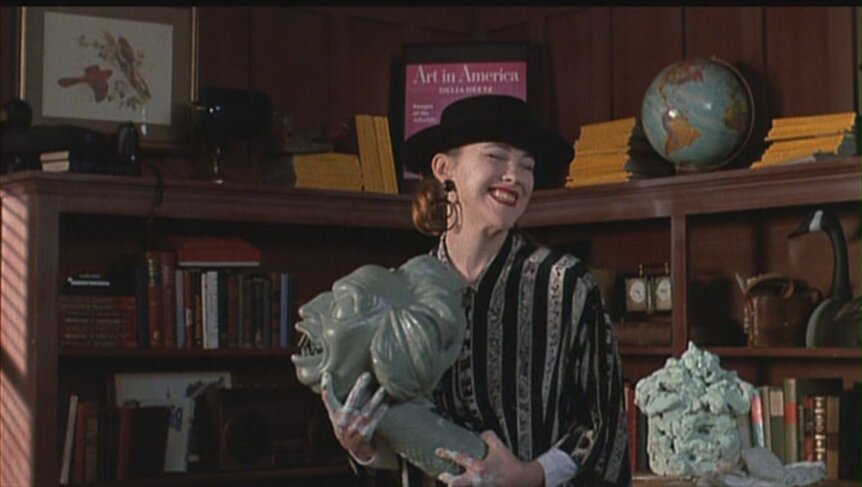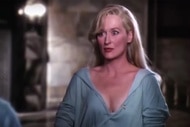Create a free profile to get unlimited access to exclusive videos, sweepstakes, and more!
In defense of Beetlejuice's Delia Deetz

Delia Deetz got a raw deal. In 1988's Beetlejuice, this eccentric artist is painted as the chief antagonist until the titular Ghost With the Most shows up. As such, she is subjected to a litany of slings and condescension. The newly-dead Maitlands view "that woman" as their personal hell on earth and a literal home-wrecker as she remodels their haunted house. Meanwhile, Delia's agent dubs her a "flake." Her stepdaughter Lydia calls her "too mean" in between scorching eye rolls. Even her husband undercuts her, suggesting the family's move from Manhattan to the sleepy town of Winter River, Connecticut, means Delia should become a humble housewife. "Look at that kitchen!" He coos, "You're finally going to be able to cook a decent meal!"
That's not what Delia wants.
Delia Deetz (the great and iconic Catherine O'Hara) is no wilting flower, modest wife, or kitchen-bound mother. She is a woman of bold vision, unapologetic ambition, and killer fashion sense. It's about time she gets the respect she so rightly deserves.
Beetlejuice is grounded in the perspective of Barbara and Adam Maitland (Geena Davis and Alex Baldwin), a conservative married couple that loves quaint wallpaper, duck detailing, and stay-cations for home improvements. They are a people of staunch plaids and modest floral prints, so when Delia Deetz strolls in with her bright red pixie cut, brazen red lips, and fiercely black attire, they are instantly on edge. But theirs is no dream house for Delia. Consider this story from her perspective.
Delia Deetz is a working sculptor, whose abstract works are challenging but unpopular. She's working tirelessly to court the New York art scene when her real estate mogul husband Charles (Jeffrey Jones) has a mental breakdown. He decides to move to a peaceful, quiet town out in the sticks. He buys the Maitland house, a towering place filled with furniture and country quirks, without Delia laying eyes on it. He upheaves his wife and daughter to a place where they have no network of friends for support. Then he kicks back in the study with some magazines and abandons the women to figure out their own paths to happiness.
For Delia, this means working. As soon as she's through the door, she's got her interior designer/bestie Otho (Glenn Shadix) on her arm and spray paint in one hand, ready to literally mark her territory.
"Deliver me from L.L. Bean," Otho snarks at the endless array of granny wallpaper. Yet, Delia will not be diminished in this dainty setting. She scrawls "mauve" across the wall, planning a vivid repaint. When Charles butts in, trying to disrupt her creative flow, she is direct about her needs. "I will not stop living and breathing art just so you can relax," she declares. "I'm here with you. I will live with you in this hellhole, but I must express myself. If you don't let me gut out this house and make it my own, I will go insane, AND I WILL TAKE YOU WITH ME!"
Respect is owed to a woman who knows what she wants and will not be silenced in making it known.
Delia dedicates herself to redesigning this "ant farm" into art. Within the three months that the Maitlands spend in the afterlife's version of the DMV, she and Otho completely overhaul the house into a modern and glorious space, befitting an ahead-of-her time artiste. Black and white tiles, speckled grey banisters, and a bright red bar mirror Delia's personal aesthetic, marking every inch of the home as hers. And why not? Charles bought the house, but Delia is its master. She directs the movers while her husband putters around the kitchen. She strategizes cleanup and renovations, while he plays amateur birdwatcher. She prepares an elegant dinner party for seven by herself while being pestered about Lydia's ghost photos, and he's off doing god knows what. It's no wonder why the Maitland's make her the Harry Belafonte in their "Banana Boat Song" spooky spectacle. They know who wears DIY drop-crotch pants in this family.
Of course, Delia has her flaws. She's arguably overly aggressive with the workmen that move the Deetzes into the house. (Though those oafs do toss her art about as if it's trash and nearly kill her and Charles with their sloppy handling of a big, clawed sculpture.) And she frequently loses her patience with Lydia, ignoring her poltergeist Polaroids, and dismissing the teen's angst with "So you were miserable in New York City, and now you're going to be miserable out here in the sticks. At least someone's life hasn't been upheaved." But some advice she gives Lydia offers insight into Delia's quick-to-the-fray attitude.
When the Maitlands refuse to perform parlor tricks for visiting gawkers, Delia takes matters into her hands by storming up the stairs to the attic. Pounding on the door, she declares, "Open this door, you dead people, or we'll bust it down and we'll drag you out by the ropes you hang yourselves with!" Lydia interjects that the Maitlands didn't kill themselves, and without missing a beat, Delia responds, "It doesn't matter. Lydia, I have a chance to teach you something here: you have got to take the upper hand in all situations or people — whether they're dead or alive — will walk all over you!"
We don't know the details of Delia's background, but this remark suggests she's had to fight hard for everything she has, her career, her rich husband, her richer closet, and her newly renovated dream house. She's not about to let it go just because of some persnickety poltergeists. Yet even in this place of wealth, comfort, and privilege, she faces disrespect daily, from employees, colleagues, the dead, and her own family.
She doesn't have much of a connection with Lydia, who refers to her only and always as "Delia" and never "Mom." No mention is made of Lydia's biological mother, which suggests the MIA mom is either dead or long out of the picture. Yet Lydia is quick to correct when Adam mistakenly calls Delia her mother and not "stepmother." Lydia pines for a mom like Barbara Maitland, soft and warm and domestic. Yet this strange and unusual girl has more in common with her stepmom, from a witchy fashion sense to a passion for the dramatic and art! It's just that Delia prefers shouting and sculpture to ghosts and photography.
Lydia's frustration with Delia is that she's not the mom she dreams of. Delia's frustration with Lydia is that she sulks instead of initiating the change she wants in her life. Delia is a whirlwind of energy and style, and loses patience with those who can't keep up! Yet over the course of the film, Lydia becomes proactive in the ways of her step-mother. The girl makes clear her desire: to be with the Maitlands. Sure, she makes a Beetlejuice mistake along the way to this goal, but ultimately her family — alive and dead — come together to sculpt a happy ending for them all.
And in that happy ending, everyone learns to compromise. Delia allows the Maitlands to turn at least part of the house back to its country vibe. The Maitlands get to co-parent Lydia, handling the schoolwork and math test reward, while Charles gets to relax (with a magazine from the publishers of The Handbook of the Recently Deceased). As for Delia, she's still working, turning the trauma of Beetlejuice's serpentine assault into an alarmingly life-like sculpture. And in the background, as she cradles her creation, keen viewers can see a framed magazine, on which Delia and her previous sculptures grace the cover.
Looking back, perhaps it's no surprise that Delia is demonized. In the yuppie '80s, working women were a popular talking point and punching bag, so an outspoken broad with artistic ambitions and little interest in domesticity was an easy figure to lampoon. Yet, for all the snarky remarks, Delia shines.
She refused to be needled by a needy husband, menaced by a moody teen, crushed by a clumsy moving crew, exiled by tempestuous ghosts, or killed by a vicious poltergeist. Through it all, Delia Deetz was a queen, staying true to herself and her passion. Like fallen soap star Moira Rose, who O'Hara would come to play years later on Schitt's Creek, Delia moved out of the luxury of Manhattan but carried her attitude, ambition, and daring style with her. So all these decades later, she is an inspiration as bold and exciting as her leather glove head-wrap.















